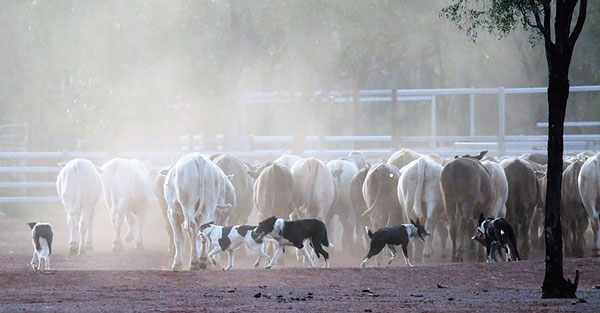
Well in my last newsletter, I postulated the ‘genie was out of the bottle’ and internationally we had a pandemic on our hands. Please forgive the pun but things have certainly panned out as predicted.
Australia has handled the pandemic exceptionally well albeit at a huge cost that will be borne largely by generations to come. Down here in Melbourne unfortunately the feared ‘second wave’ has hit which will impact on people and businesses at least until the end of the year. As Tash discusses in her column the impact on local agricultural activity has so far been minimal and agriculture will play a large part in the economic recovery. However, agriculture is in such a better place when combined with strong regional economies which can only be sustained when they are assisted by non- agricultural activity and unfortunately these economic activities have been hit by Covid 19 and will be for some time.
At Chemvet, the strategies put in place early in the piece and some continued hard work has meant that so far we have experienced little interruption to product availability. Our major issue has been international freight which has been really impacted by the virus and may give us a bit of a headache cost and price wise in the months to come. We are continuing to bring forward manufacturing orders and holding extra stock just in case the second wave has an impact on our local manufacturing plants. We have also procured extra warehouse space in part to accommodate the extra stock as well as extra space required for new products coming on line.
Whilst wool prices are a bit of a worry the general outlook for our livestock industries appears sound with world demand strong and herd and flock rebuilding at home here in Australia. Hopefully, meat processors can overcome the recent ob-stacles thrown up by the virus affecting their workforce and this does not cause extra volatility in farm gate prices.
Sheep wise, lamb marking and shearing are just around the corner so please take note of our Strikemaster and Bodyguard promotions over the page.
On a personal note it is a difficult time for everyone in Australia with COVID 19 but especially for many where it has come on the back of drought or fires. Remember if you need support reach out – there will always be someone there to help.
Murray Grant

Cattle News
Ringworm and Lice on Cattle
I am often asked what the difference is between lice and ringworm on cattle.
Both conditions involve hair loss and rubbing and often involve a number of animals in the herd. The two conditions can generally be differentiated by the type of skin lesions and the age of the animal as well as the time of the year.
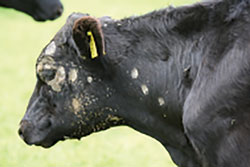
With ringworm, which is caused by a fungal infection of the skin, the hair loss is always in discrete roundish “punched-out’ type lesions more commonly located around the head and neck but can extend over the body. Often there is circular hair loss around one or both eyes. The common time of year for this to occur is the autumn (warm & moist) and the outbreaks normally occur in mobs of young cattle. This is because after infection the cattle become immune.
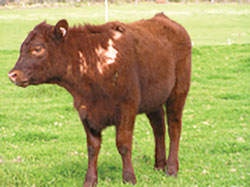
With lice, the hair loss can vary with the type of lice causing the infestation. But is generally around the neck although it can extend towards the head of the animal or towards the shoulder and over the trunk of the animal. The hair loss is very irregular in nature and generally involves quite large patches. Generally the lice are quite easy to see. All animals in the mob can be affected cows, bulls and weaners. Lice hate light so infestations generally start in the autumn but only show symptoms as the lice build up over the winter and spring and tend to disappear when the animals cut their coat for the summer.
Treatments and control vary markedly so a good diagnosis is important.
With ringworm the condition can be treated, but in Australia all treatments involve numerous individual frequent topical antifungal treatments. So, unless we are treating a small stud show team, treatment is impractical and not possible. Immunity develops in affected animals and the condition generally disappears over 8 – 16 weeks. The spread amongst a mob of young cattle can often be lessened by removing infected animals into a hospital mob as soon as you see the condition develop. A point to note is that cattle ringworm is the most serious form of ringworm in Humans. Most Cattlemen are immune but if children who are not often around cattle get a weepy skin lesion, get it checked out for ringworm.
With lice treatment, there is plenty of debate around whether you should treat lice in cattle. However I have a couple of mantra’s that ‘you should attempt to always have your cattle in a saleable condition’ and ‘unhappy host – happy parasite’, so if lice are really obvious in your herd or if the cattle are ‘down’ for other reasons then you should treat if possible.
Treatment involves a lice specific backline product (generally a pyrethroid such as permethrin) or a multi purpose worm and lice product such as Vetmec Pour-on. Just remember the mectin pour-on hasn’t the length of residual activity as the pyrethroid products so make sure that when you treat, treat all animals that are going to contact each other through until the summer. Injectable ‘mectin’ products such as Vetmec F are also super effective against sucking lice, however can be less so against biting lice.
Summary
| Ringworm | Lice | |
| Time of year | Autumn | Winter /Spring |
| Hair loss | Often head eyes and neck | Generally neck shoulders trunk |
| Animals affected | Weaner/yearlings | All ages |
| Treatment | Generally not practicable | Vetmec Pour-on or a Pyrethroid pouron |

Sheep News
Lamb Marking and Shearing is coming up.
Plus, fly season is just around the corner. If you haven’t yet, make sure you check out our Lice and Blowfly products!
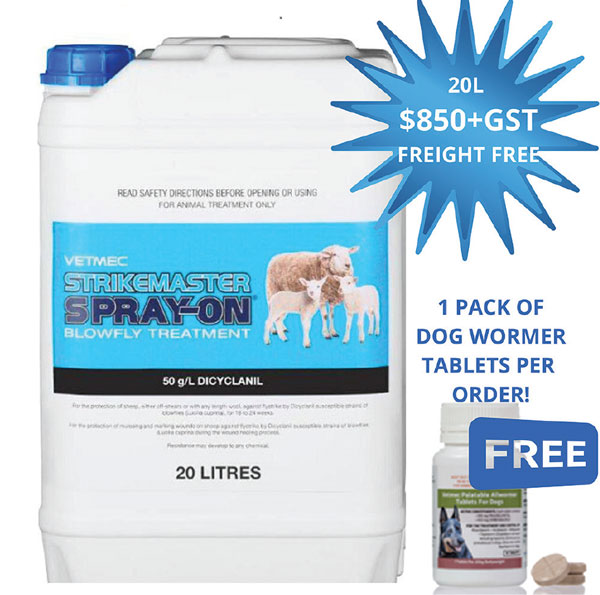
STRIKEMASTER is a spray-on Blowfly treatment containing 50 g/L Dicyclanil, the equivalent to Clik™. For genuine 6 months fly protection switch to STRIKEMASTER and save, save, save!
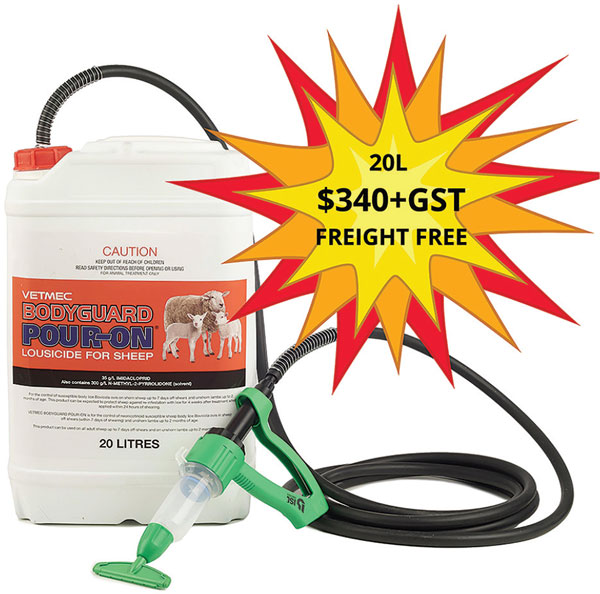
VETMEC BODYGUARD is an Imidacloprid based Off-shears Pour-on Lousicide equivalent to Avenge™. Bodyguard comes in the award winning ‘non-glug’ 20L container.

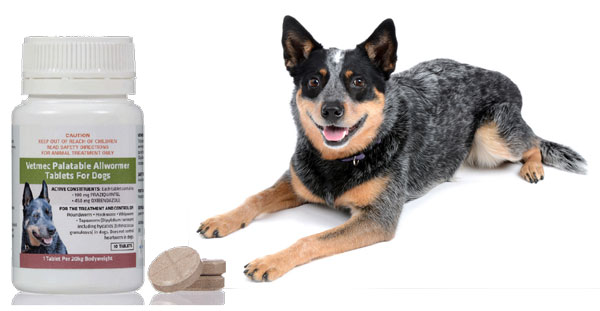
Vetmec Palatable Allwormer
Tablets for dogs
Our Strikemaster ‘newsletter special’* is a bottle of our ALLWORMERS dog tablets – treats 10 dogs (at 20 kgs), includes hydatids with every purchase order of STRIKEMASTER.
We figure your dogs will be pushing up the sheep in the race for you to treat for lice or flies and they need to be on top of their job and worm free (plus dogs love the taste so it’s a treat!).
*Newsletter special ends October 31 2020

Drum Muster
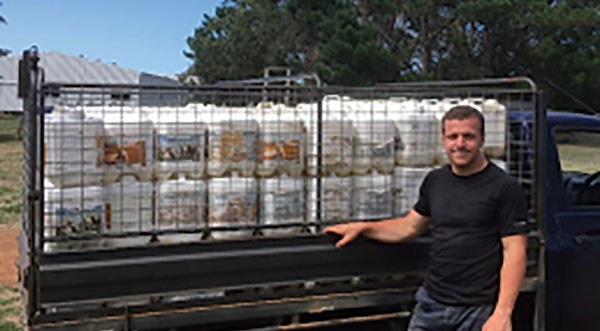
Photo above shows Thibaud Guichardiere finishing loading 200 empty Vetmec drench drums at Gerard and Sabrina Watt’s Balmoral property. The drums are destined for the local Drum Muster and Gerard estimates this represents approximately 175,000 doses over about seven years.
Thibaud, who is from near Laval in north western France is a family friend and was helping out at the wool growing property. He has just returned to France and starts a veterinary course in Croatia in September – best of luck Thibaud with your course from Chemvet! By the way Geoff reckons the shed in the background is one of the best shearing sheds in the country.

Client Photos
Our cover photo is another great shot provided by our ‘star’ contributor Sue Zefera. Fat cattle, work hungry dogs and a bit of dust. It doesn’t get better than that! Anyone with a good rural shot, please send it in to us. We love featuring client photos in our newsletter and on our Facebook page.

Tag Offer – Free ‘no tear’ tagger
Order over 200 Zeetag NLIS tags and receive a free no tear tagger (worth $42) Offer ends 30th September!

Geoff & The Leper State

Restrictions on travel out of Victoria into other states has really put the brakes on Geoff being able to get about visiting our clients. Trips to Central Queensland, Northern NSW and Tasmania, that were on the calendar over the last couple of months, have all had to be pulled. Geoff has tried to make up with phone calls to catch up with our clients in these areas but this is no substitute for a visit and I know Geoff has really missed making these trips and catching up with our clients.

Tash’s Corner

Since our last newsletter, unlike cities, life on the farm hasn’t changed very much; crops were still planted and animals are still kept healthy and fed.
It has been interesting to experience a pandemic on both sides of the rural-urban divide. In the beginning I remained in Melbourne and battled my way through the meat and pasta isles at the supermarket while the world might as well have been ending. Then I came home to our farm in the Wimmera and life was basically as normal – minus the ability to purchase toilet paper.
Apart from working a couple of weeks onsite for CHEMVET I have remained at home.
University ran online and will continue to do so for the rest of the year. Completing university from home and the ability to log-on and work remotely for Chemvet opened a lot of doors for rearing four orphan lambs and taking care of my kelpie, Millie, and her litter of seven puppies (pictured).

In the Summer newsletter, I spoke about the evokeAG expo and its ability to connect farmers with others in the industry. This has changed drastically in the four months since, and it is now the internet that will keep us connected and updated.
In light of COVID-19, extraordinary opportunities have presented to make better use of the extra resources that have become available at just the ‘click of the button’. For a week during the university’s winter break, the AgriFutures Horizon Workshop was meant to run in Albury. That workshop is now scheduled for two hours a week for the next couple of months, where almost forty keen agriculture students and program facilitators get together on zoom and tackle the big questions. Many field days, conference style events and educational programs are being run online as well. So instead of having to travel enormous distances to speak at or attend these events, they’re able to be accessed from the comfort of our own homes or farm office.
If you find yourself in a position where the number of ‘cases’ are getting you down, remember that you are a part of the industry that will rebuild the nation and now may be the time to ‘get on-line’ and equip yourself with the skills and knowledge to do so.
Even visit the Chemvet Website, where with a ‘couple of clicks’ you can purchase the right product at the right price and have it delivered without leaving the farm office, or motor bike when you are out looking at the mob.


